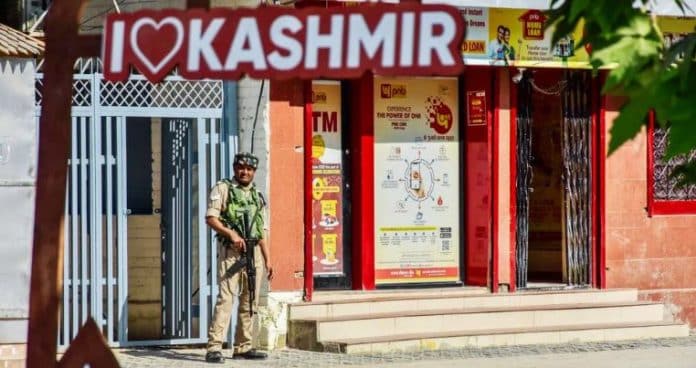During the G20 tourism summit held in Indian-held Kashmir, the Indian government’s efforts to promote tourism in the region have faced criticism from Kashmiris. They accuse India of using the event as a means to conceal its military occupation. Images of Indian soldiers strategically positioned behind posters depicting scenic mountain views have drawn the ire of Kashmiris, who believe this tactic is an attempt to mask the reality of India’s rule.
Misrepresentation of Kashmir at G20 Summit Diverts Attention
As part of its public relations campaign, India organized visits to local markets in Srinagar, the capital of the disputed region, and arranged yoga classes and dance shows for G20 delegates. However, Kashmiris argue that these initiatives are merely facades aimed at diverting attention from the military presence in the region. Estimates suggest that around 500,000 soldiers are deployed in Indian-held Kashmir, a situation that many Kashmiris vehemently oppose.
https://twitter.com/hurriyatjk/status/1660554956099780608
A photo circulated by pro-India accounts, claiming to depict the transformation of Boulevard Road in Srinagar since the revocation of Kashmir’s semi-autonomy, was met with ridicule on social media. Users pointed out that the image actually showed a street in Bangladesh. In response, social media users shared more photos from various parts of the world, sarcastically implying that these were the areas of Srinagar that had undergone a remarkable makeover.
Social media users have been quick to highlight the stark contrast between the areas along the G20 delegate route and the rest of the city. They have pointed out how the city appeared unusually clean and well-maintained, leading to sarcastic remarks about the meticulous preparation undertaken solely for the summit. Some sarcastically joked about the absence of other tourists in the city, suggesting that the efforts were solely directed at impressing the G20 delegates.
https://twitter.com/SB2weets/status/1660689125358579714
Calls to Boycott the Meeting
Many groups, including the ‘Stand With Kashmir’ boycott campaign, have called for a boycott of the G20. They criticize member states and delegates for attending India’s events in Kashmir, arguing that by doing so, they are complicit in abetting India and neglecting the rights of Kashmiris.
Altaf Hussein, a Kashmiri activist based in Pakistan, tweeted a picture of Kashmiris being searched by Indian security forces, emphasizing the contrast between the tourism image projected by India and the reality of oppression faced by Kashmiris. Hussein stated that while India portrays it as tourism, for Kashmiris, it represents further oppression, humiliation, and disgrace. He expressed the desire for tourism in the region but not at the cost of state terrorism.
https://twitter.com/sultan1913/status/1662025800734867456
Noam Chomsky, a well-known philosopher, linguist, and political analyst, expresses his strong condemnation of the G20 holding a tourism meeting in the region of occupied and brutalized Kashmir. He highlights the historical context of India, emphasizing its rich contributions to civilization before British colonization and the subsequent suffering caused by British rule, including the devastation of India’s wealth and advanced technology. Chomsky identifies the partition and the creation of Kashmir as one of the many victims of this history. He asserts that it is morally unacceptable for the G20 to organize any meeting, particularly a tourism meeting, in a region that is occupied and subjected to brutalization.
https://twitter.com/jawaad_nasir/status/1661333359103209474
Hosting an International Meeting in a Disputed Territory
The conflict in Kashmir dates back to 1947 when the region was divided between Pakistan and India. Both countries have engaged in three wars over control of the entire region, while many Kashmiris aspire for independence. In 2019, India revoked the semi-autonomous status of Jammu and Kashmir, which had been administered as a state. Since then, human rights organizations have accused India of committing severe human rights violations and suppressing freedom of expression. India, on the other hand, argues that it is focused on the development of the region.
The international community also recognizes it as a disputed territory, so hosting a global summit in this contentious region is a provocative move. By organizing a tourism-focused event in Kashmir, India came off as trying to divert attention away from the ongoing conflict and human rights issues in the region. Its deliberate attempt to showcase a positive image of the area disregards the concerns and aspirations of the local Kashmiri population.
Misusing G20 Presidency
Kashmir has a significant military presence, with hundreds of thousands of Indian soldiers deployed in the region. Hosting a tourism event in such circumstances camouflages the occupation and projects a false sense of normalcy, while the local population experiences restrictions and human rights abuses.
The decision to host the G20 summit in Indian-occupied Kashmir without meaningful consultation with the local population or involvement of their elected representatives raises questions about inclusivity and legitimacy. It undermines the principles of democracy and self-determination, which are essential for resolving the long-standing Kashmir conflict. Mehbooba Mufti, the former chief minister of Jammu and Kashmir, has expressed strong criticism, likening the situation in the region to the infamous Guantánamo Bay prison, all for the sake of hosting a tourism meeting. Mufti further accused the Bharatiya Janata Party (BJP), led by Prime Minister Narendra Modi, of exploiting the G20 summit for their own promotional agenda.
Participants Complicit in Occupation
Moreover, despite the boycott calls, the countries joining the meeting showed that they had no problem meeting with the occupying power in the occupied territory. The US, who routinely criticizes Russia for its involvement in Ukraine, was at the forefront of this meeting. Critics have questioned the US about what it would do if in the future Russia wanted to hold the G20 presidency and invite delegates to the occupied Ukraine.
The US and allies may want to appease India because they want it to act as a wall against China. However, critics argue that by participating in its propaganda campaign, these countries, including the US, UK, and France, have become complicit in the repression of Kashmir.


